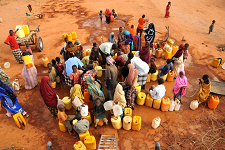By Mekonnen Teshome:
Following the major decision of the Conference of Parties (COP27) to establish a fund to compensate vulnerable nations for ‘loss and damage’ from climate-induced disasters on 20 November in Sharm el-Sheikh, Egypt, experts are urging for rural women and children to be the center of the
global climate action.
African rural women and children, being highly affected by traditional inequalities and poverty, are more vulnerable to adverse impacts of climate change than men and necessary attention should be given to them as part of the global compensation schemes, according experts working on climate resilience and adaptation.
African Policy Study Expert Mr. Endale Haile says that there are numerous studies that have documented evidences why African women and children should be priorities of the global climate change resilience and adaptation efforts. As to the expert, gender inequality among rural African women due to various
customary traditions is prevalent and it makes women more vulnerable than men to climate change-induced food insecurity and related risks.
“There are many studies that substantiate the fact that women and children are more susceptible and have less adaptive capacity to climate change due to lack wealth ownership, household-level decision power, opportunities for community-level participation ,wealth inheritance, household burdens and health. However, evidences show that women make higher contributions to household-level adaptation to recurrent drought and weather variability.”
A gender studies post-graduate fellow with the Addis Ababa University and women affairs expert with Addis Ababa City Administration Selamawit Birku on her part climate change adaptation programs should follow a gender approach that consider the distinctions between women and men including in vulnerabilities, adaptive potentials and limitations for their successful implementation.
Participants of this year’s Conference of Parties (COP27) during the Gender Thematic Day also reaffirmed that women continue to bear a disproportionate burden of the adverse impacts created by climate change. At the occasion, the African Women’s Climate Adaptive Priorities (AWCAP)
initiative stems from a key insight that in the wake of disasters, women and children are ~80% of those needing assistance, while poor women in rural areas are 14 times more likely to die during a natural disaster.
Ethiopian Prime Minister Abiy Ahmed in his statement he gave in connection with COP27 also underscored that need to avail finance for Africans in general and African Rural women in particular to be able to help them adapt the effects of climate change.
“Africa is the most vulnerable to climate change, while accounting for less than 5% of global greenhouse gas emissions and approximately 17% of total global population. Nonetheless, Africa receives less than 5% of the world’s climate fund, which is mainly in debt. Combating climate change requires a collaborative effort and adequate funding.”
The Prime Minister indicated that climate change could push more than 100 million people into poverty by 2030 if appropriate adaptation measures are not taken. Ethiopia is near the bottom of the carbon emissions scale, but it is disproportionately vulnerable to climate change.
“While we are proud of our achievements and are meeting our nationally determined targets, there is still work to be done to protect our people and the environment. Ethiopia is, indeed, in the eye of the storm,” he added.
The Premier said that increased funding must reflect the magnitude of Africa’s challenge, and he added, that countries must honor their climate pledges, provide the necessary financing, and address the outstanding issues of loss and damage and the carbon trading mechanism in ways that allow for faster results.
He further explained that eight out of ten Ethiopians live in rural areas and rely on erratic rain-fed subsistence farming. Those who have made the least contribution to climate change suffer the most.
President of the African Development Bank, AfDB, Akinwumi Adesina, speaking at the COP27 highlighted that Africa today loses between $7 billion and $15 billion a year to climate change. “And if things don’t change, it will be $50 billion a year by 2030. Africa doesn’t have access to the financing it needs to adapt to climate change and meet nationally determined contributions. By 2030 Africa will need between $1.3 to $1.6 trillion.”
African climate adaptation experts advise for a continental Strategy that defines the main priorities, interventions and actions required to build resilient capacities for adaptation, reduce the vulnerability of affected communities, and manage the risks related to climate change and climate-induced extreme events, as well as to unlock the benefits of the mitigation potential of the continent.

